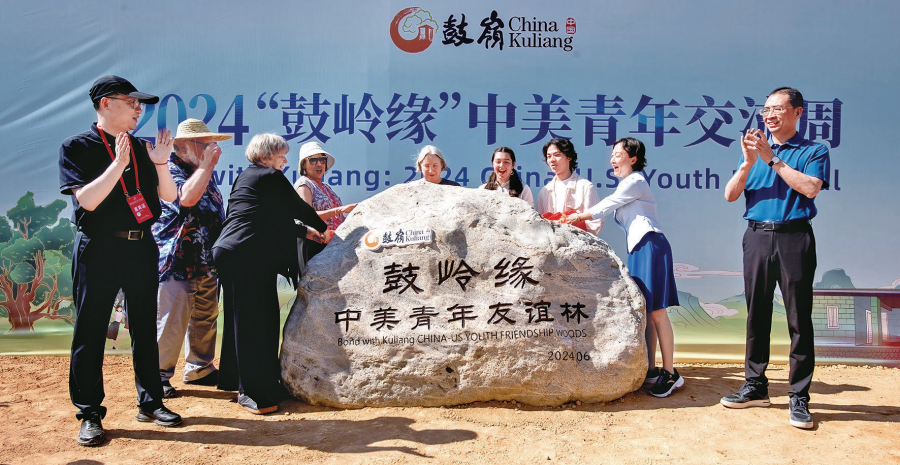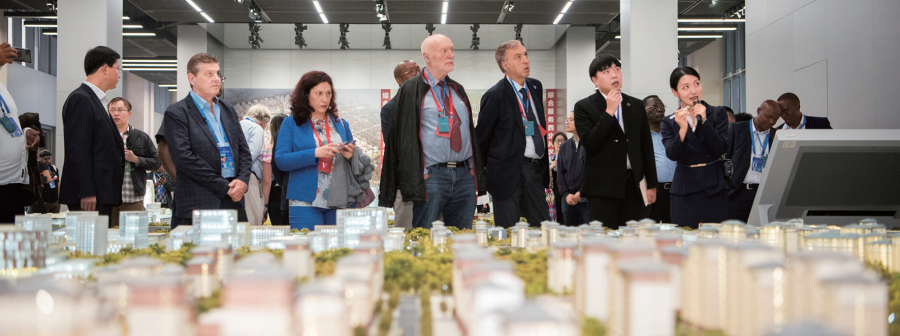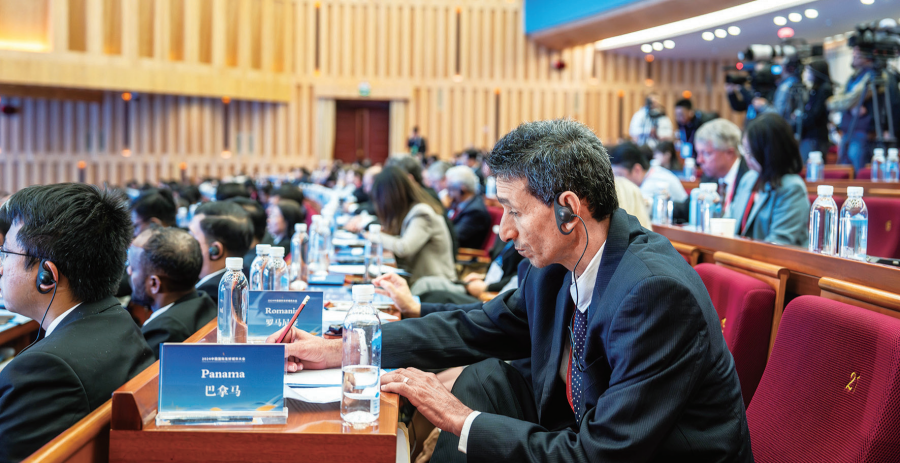The Great Significance of People’s Diplomacy and the Friendship Between Peoples
One notable feature of China’s diplomacy is our emphasis on and active engagement in people-to-people diplomacy. Since the 18th National Congress of the Communist Party of China (CPC) in 2012, President Xi Jinping has given his personal guidance to and participated in major people-to-people diplomacy events. Through a series of important statements, he has provided fundamental guidance and clear direction for people-to-people diplomacy in the new era and opened up new frontiers in both the theory and practice of people’s diplomacy in China.
The CPC’s proud tradition of engaging in people-to-people diplomacy
During the time when the CPC Central Committee was located in Yan’an (1935–1948), Mao Zedong and other veteran revolutionary leaders showed great foresight in their efforts to win international sympathy and support for China’s liberation cause by forging friendships with people from around the world. Edgar Snow, the famous American writer and progressive journalist, provided Western audiences with an accurate portrayal of the lives and political perspectives of Chinese Communists through his seminal work Red Star over China, which was based on his firsthand interviews in China’s revolutionary areas. Many more illustrious names—George Hatem, Dr. Norman Bethune, Rewi Alley, Agnes Smedley, and Anna Louise Strong—stand as an enduring testament to the people’s diplomacy carried out by the CPC during the revolutionary war period. In the years following the founding of the People’s Republic of China in 1949, China’s most pressing diplomatic tasks were to oppose war, advocate for peace, and break through the blockade imposed by Western nations. In instances where formal diplomatic relations had not yet been established or had encountered difficulties, people-to-people diplomacy played a unique role, serving as a channel for initial contact and laying the groundwork for official engagement. In 1971, Chairman Mao Zedong seized a historic opportunity when he invited the US table tennis delegation to visit China. The visit created a sensation and played a crucial role in initiating the normalization of relations between China and the United States. Similarly, the Shanghai Dance Troupe greatly contributed to the normalization of diplomatic relations between China and Japan, when it toured Japan in July 1972, performing the ballet The White-Haired Girl. Following the launch of reform and opening up in 1978, the CPC and the government continued to advance people-to-people diplomacy, steadily promoting broader and more substantive engagement through more diverse channels. China made important achievements and gained valuable experience in people’s diplomacy during this time. Since the start of the new era in 2012, the CPC Central Committee with Xi Jinping at the core has promoted comprehensive and multifaceted people-to-people diplomacy across various levels and fields. This has allowed the Chinese people to develop a stronger mutual understanding with people in other countries and engage with them on a genuine level, paving the way for new achievements in people-to-people diplomacy.

Chinese and foreign participants of the “Bond with Kuliang: 2024 China-US Youth Festival” unveil a commemorative monument at the China-US youth friendship woods in Kuliang on the opening day of the festival, Fuzhou, Fujian Province, June 24, 2024. Under the theme of “Carrying Forward the Bond with Kuliang and Deepening Friendship,” the event brought together over 300 Chinese youths and more than 200 young Americans from 29 US states, districts, and overseas territories and over 10 industries. PHOTO BY XINHUA REPORTER WEI PEIQUAN
The importance of friendship between peoples in promoting world peace and development
At present, changes of great significance are unfolding like never before in the world. Despite this, certain things remain unchanged, i.e., the interests and destinies of all countries are intertwined; people of all countries have the common desire for peace, development, cooperation, and mutual benefit. President Xi Jinping places great store in the role of friendship between peoples in promoting interstate relations and world peace and development. He has stressed that “Friendship between peoples is the bedrock of stable and sustainable international relations, a boundless force for world peace and development, and a basic precondition for mutually beneficial cooperation.” He also has noted that “People of all countries can only realize their shared aspiration for peace and development when they unite through the philosophy and bond of friendship.” He has declared, “The Chinese people reject the notion that ‘a strong country inevitably seeks hegemony.’ We want to live and develop in harmony with people around the world and jointly work with them to promote peace, protect it, and share in its fruits.” President Xi’s insightful statements shed light on the fundamental role of friendship between peoples in advancing international relations and world peace and development. They make it clear that people-to-people diplomacy must focus on the people and fulfill the fundamental purpose of serving their needs. They also fully illustrate the power of friendship in promoting world peace and development and affirm the pivotal role of people-to-people diplomacy in China’s overall diplomatic framework.

International guests tour a service center in Xiong’an New Area, October 12, 2024. After attending the China International Friendship Conference and Events Marking the 70th Anniversary of the Chinese People’s Association for Friendship with Foreign Countries, over one hundred international guests joined a tour of Xiong’an New Area, visiting sites such as the comprehensive service center, Yannandi area in Baiyangdian, and the East-West axis public transportation project, October 12 and 13, 2024. The trip offered a close-up look at the development of China’s “city of the future.” CHINESE PEOPLE’S ASSOCIATION FOR FRIENDSHIP WITH FOREIGN COUNTRIES
The unique role of people-to-people diplomacy in China’s proposal to build a global community of shared future
In a time of once-in-a century changes, the countries of the world have never been more closely connected. We are bound together by a shared future. The direction of our world depends on the choices made by the peoples of all countries. President Xi has said, “The people are the creators of history, and building a global community of shared future is the way forward for all the world’s peoples.” He has further emphasized, “In the face of complex international developments and grave global challenges, people from all countries need to strengthen friendly exchanges and work together to navigate difficulties.” He has called for efforts to create broad consensus for building a global community of shared future based on the notion of jointly caring for the planet as our one and only home; to generate synergy for this community by acting on the principle of mutually beneficial cooperation; and to create a vibrant and diverse cultural vision for this community by embracing an open and inclusive mindset. Through his penetrating statements, President Xi has made it clear that building a global community of shared future is about closely linking the interests and future of the Chinese people with those of people in countries across the world in order to transcend differences in social systems and ideologies and embrace variations in history, culture, and development stages. These statements represent a powerful intellectual guide for advancing the building of a global community of shared future and are a shining banner for people-to-people diplomacy in the new era.

The China International Friendship Cities Conference 2024 opens in Kunming, Yunnan Province, November 18, 2024. Themed “Common Prosperity, Shared Future,” the event welcomed over 700 participants, including local government representatives from 41 countries across five continents. PHOTO BY XINHUA REPORTER HU CHAO
The crucial role of people-to-people friendship in seeking shared development among the nations
China must be open to the world to achieve development, while the world needs China’s engagement to realize prosperity. President Xi has emphasized, “China is not pursuing modernization for itself alone. Rather, it welcomes more international friends to get involved in the process of Chinese modernization." He has also declared, “Based on the principle of mutually beneficial cooperation, China will continue to provide new opportunities for global development through the achievements we secure in Chinese modernization. We are ready to work with all countries to advance global modernization featuring peaceful development, mutually beneficial cooperation, and common prosperity to create greater benefits for people in all countries.” On reflection, we can see that the achievements China has secured across all spheres have been possible only with the support of people in various countries. Countless international friends have traveled to China from different parts of the world; they have stood with our people through thick and thin and worked with them to contribute to China’s socialist modernization drive. As we look to the future, in order to advance Chinese modernization, we must continue to nurture our friendships with all peoples, promote mutual support between us, and strengthen friendly exchanges and cooperation across all fields.
Yang Wanming is President and Secretary of the CPC Leadership Group, the Chinese People’s Association for Friendship with Foreign Countries.
(Originally appeared in Qiushi Journal, Chinese edition, No. 3, 2025)
























